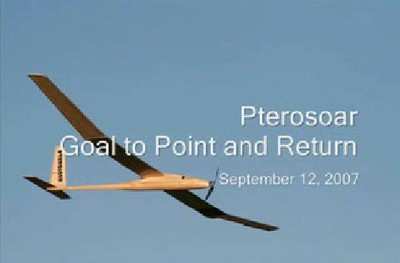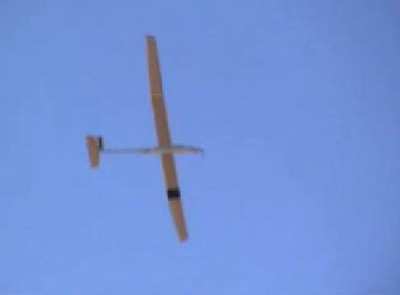Mon, Nov 05, 2007
Uses Hydrogen Fuel Cells
An Unmanned Aerial Vehicle powered with hydrogen fuel cells just
broke a world record by flying 78 miles, 28 miles farther than the
previous record set in 2006. It might look to you like a typical
model airplane, but it's a UAV called the Pterosaur powered by a
highly efficient hydrogen fuel cell and its makers say that "you
haven't seen anything yet," according to Gizmodo.com.

The distinguished group of scientists who created the Pterosaur
says it only used a quarter tank of fuel, anticipating more world
records to be broken with this plane that has a range of 310
miles.
Powered by the hydrogen fuel cell similar to the one inside the
HyFish, lifting body aircraft as
previously reported, the scientists are impressed with
this record-breaking performance, and say there are even more
sophisticated fuel cell power plants for aircraft on the way.
This is significant as environmental laws emerge to limit carbon
emissions into the atmosphere globally and as UAVs become more
prevalent. Unmanned Aerial Vehicles (UAVs) also happen to be the
fastest growing segment of the aerospace industry today, a market
estimated by the Teal Group to be worth $54 billion over the next
10 years.
Globally, aviation accounts for approximately 4 to 9 % of the
climate change impact of human activity, and it is also the fastest
growing source of greenhouse gas emissions, according to Horizon
Fuel Cell Technologies. One technology that offers the possibility
of reducing the environmental impact of the aviation industry is
emerging fuel cell technology.
Fuel cells are quiet and clean electrical power sources and have
low thermal signature. Such devices can be used for primary or
auxiliary power generation in centralized or distributed electrical
configurations.

Starting small, Horizon identified the nearest term commercial
opportunity for its fuel cell systems to reside in small unmanned
aircraft currently using electrical propulsion systems, where a
performance advantage exists already today. Unmanned Aerial
Vehicles (UAVs) also happen to be the fastest growing segment of
the aerospace industry today, a market estimated by the Teal Group
to be worth $54 billion over the next 10 years.
More News
Its Offerings Are Lighter, Cleaner, and Now Pushing Past 1,000nm on SAF Jet Fuel DeltaHawk’s diesel-powered aircraft lineup has seen incredible upgrades over the last few yea>[...]
The Airplane Experienced A Total Loss Of Engine Power On December 3, 2025, about 1600 central standard time, a Mooney Aircraft Corp. M20K, N57229, was substantially damaged when it>[...]
Make Sure You NEVER Miss A New Story From Aero-News Network Do you ever feel like you never see posts from a certain person or page on Facebook or Instagram? Here’s how you c>[...]
Aero Linx: European Society of Aerospace Medicine (ESAM) As a pan-European, independent forum, it works to promote the safety and health of all persons involved in aviation and spa>[...]
“We are excited to see Wisk achieve this milestone, and I’m so proud of the team that made it possible. The team at Wisk has built advanced technologies across flight c>[...]
 Aero-TV: DeltaHawks Diesel Power Steps Into the Spotlight
Aero-TV: DeltaHawks Diesel Power Steps Into the Spotlight NTSB Prelim: Mooney Aircraft Corp. M20K
NTSB Prelim: Mooney Aircraft Corp. M20K ANN FAQ: Turn On Post Notifications
ANN FAQ: Turn On Post Notifications ANN's Daily Aero-Linx (12.20.25)
ANN's Daily Aero-Linx (12.20.25) Aero-News: Quote of the Day (12.20.25)
Aero-News: Quote of the Day (12.20.25)




